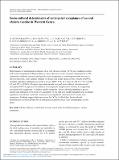| dc.contributor.author | N Sundaram, C Schaetti, C-L Chaignat, R Hutubessy, EO Nyambedha, LA Mbonga, Mitchell Gralnick Weiss | |
| dc.date.accessioned | 2020-07-27T08:34:23Z | |
| dc.date.available | 2020-07-27T08:34:23Z | |
| dc.date.issued | 2013-03 | |
| dc.identifier.uri | https://repository.maseno.ac.ke/handle/123456789/1598 | |
| dc.description.abstract | Determinants of anticipated acceptance of an oral cholera vaccine (OCV) were studied in urban and rural communities of Western Kenya. An explanatory model interview administered to 379 community residents assessed anticipated vaccine acceptance at various prices from no cost to full-cost recovery, socio-cultural features of cholera and social characteristics. Nearly all (99%) residents indicated willingness to accept a no-cost OCV, 95% at a price of US$ 0·8, 73% at US$ 4·2 and 59% at US$ 8·4. Logistic regression models analysed socio-cultural determinants of anticipated OCV acceptance. Prominence of non-specific symptoms for cholera was negatively associated with acceptance. A cholera-specific symptom (thirst), self-help referring to prayer, income and education were positively associated. In the high-cost model, education was no longer significant and reliance on herbal treatment was a significant determinant of vaccine non-acceptance. Findings suggest high motivation for OCVs, if affordable. Socio-cultural determinants are better predictors of anticipated acceptance than socio-demographic factors alone. | en_US |
| dc.publisher | Cambridge University Press | en_US |
| dc.subject | Cholera, Kenya, oral cholera vaccine, social and cultural determinants, vaccine acceptance. | en_US |
| dc.title | Socio-cultural determinants of anticipated acceptance of an oral cholera vaccine in Western Kenya | en_US |
| dc.type | Article | en_US |

